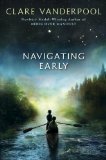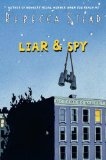Summary | Excerpt | Reviews | Beyond the book | Read-Alikes | Genres & Themes | Author Bio

Abilene Tucker is a kind of reverse Huck Finn. She has grown up on the road, riding the rails during the Depression with her father, moving between jobs and hobo camps. Her story properly begins the moment she jumps off a train and lands in Manifest, Kansas, alone and friendless. Her father had taught her to leap off a few hundred yards before a station so she can sneak into a town and get the lay of the land before making a proper appearance.
"At the last car, I waited, listening the way I'd been taught—wait till the clack of the train wheels slows to the rhythm of your heartbeat. The trouble is my heart speeds up when I'm looking at the ground rushing by. Finally, I saw a grassy spot and jumped. The ground came quick and hard, but I landed and rolled as the train lumbered on without a thank-you or goodbye."
Abilene's entry into Manifest is as quick and hard as that ground. Being planted in the tight-knit community feels to her like abandonment. She doesn't know why her father has sent her to this place. Only later does she come to appreciate the irony of the town's name: "Manifest—verb. To reveal, to make known."
And so Abilene finds herself launched on a kind of personal detective story at the same time that she stumbles across a mystery in the town's own past. She laments her own lack of a narrative.
"'Telling a story ain't hard,' Lettie had said. 'All you need is a beginning, middle, and end.'
But that was the problem. I was all middle. I'd always been between the last place and the next."
But this in-betweenness turns out to be precisely what she needs to bridge the gap between the ailing town of Manifest as she finds it, and its far more colorful, busy past, in the days of her father's boyhood. She begins to read old newspapers, to listen to the hypnotic recollections of a faintly sinister gypsy woman, and to follow up the talismanic clues she finds in an old cigar box under a floorboard. She thinks she is on the trail of a wartime spy amongst the townsfolk, but soon she rediscovers a town-wide conspiracy to outsmart the fiendish coal mine boss who oppressed his immigrant workers. Her discoveries prompt her new neighbors to dust off their own memories, and by the end of the book, Abilene has handed Manifest back to itself, retold and revived.
Vanderpool's language is simple, honest, and memorable. To Abilene, listening to her father's stories of Manifest "was like sucking on butterscotch. Smooth and sweet." She visits the newspaper office and sees a broken typewriter, "its keys splayed open with some scattered on the desk like it tried to spell explosion and the explosion happened." But make no mistake, this is a plot-driven story, not a character-driven one. There is a clue or revelation in each chapter, and the narration switches frequently between 1918 and 1936 (a trick accomplished with many cues for the younger reader, like dates at the beginning of each chapter and a different font for each time period). Wonderfully, some of the chapters consist solely of primary documents, two- or three-page-long newspaper articles or letters.
Moon Over Manifest strikes me as a children's book animated by an expressly adult sentiment: nostalgia for a simpler past. The Newbery award committee obviously related to this powerful emotion, but does its intended audience of fifth to eighth graders? Vanderpool calls upon a kind of a sepia-tinged longing for a very recent past which seems just out of reach. I'm not sure that young readers naturally feel that emotion, but perhaps the point of the book is to teach them this, to make them curious about the past and how it has created us, to nudge them into realizing that the past is retrievable, with just a little detective work and literary imagination.
Vanderpool offers a fairytale version of history, one in which every object shines with latent meaning, every character has a role in the unfolding story, every plot thread will soon be woven into the whole. There are several very strong plot echoes among the embedded stories, such as the leg injuries that both Abilene and the gypsy woman suffer, or the nearly identical encounters that two of the main characters each have with guns in wooded clearings at night. The book strongly reminded me of Grace Lin's Where the Mountain Meets the Moon, whose subject matter is entirely different, but which also efficiently, gratifyingly uses up each detail in its journey to the end of the story.
Moon Over Manifest isn't quite as tight as it would like to be, and several of the plot threads, such as the mystery of the wartime spy that is supposed to propel the whole novel, fray and break at the end. But the novel ends beautifully, with Abilene sitting on a railroad tie, reunited with her father after she has tied together the puzzle that links 1918 to 1936: "I told him the story I'd needed to hear." That's how all good stories are born, from the desires of their tellers. The readers or listeners are lucky to be recipients.
![]() This review was originally published in The BookBrowse Review in April 2011, and has been updated for the
January 2012 edition.
Click here to go to this issue.
This review was originally published in The BookBrowse Review in April 2011, and has been updated for the
January 2012 edition.
Click here to go to this issue.

If you liked Moon Over Manifest, try these:

by Clare Vanderpool
Published 2014
New York Times Best Seller Navigating Early by Clare Vanderpool, Newbery Medalist for Moon Over Manifest, is an odyssey-like adventure of two boys' incredible quest on the Appalachian Trail where they deal with pirates, buried secrets, and extraordinary encounters.

by Rebecca Stead
Published 2013
Liar & Spy is an inspired, often-funny story about destiny, goofy brilliance, and courage. Like Stead's Newbery Medal-winning When You Reach Me, it will keep readers guessing until the end
Your guide toexceptional books
BookBrowse seeks out and recommends the best in contemporary fiction and nonfiction—books that not only engage and entertain but also deepen our understanding of ourselves and the world around us.